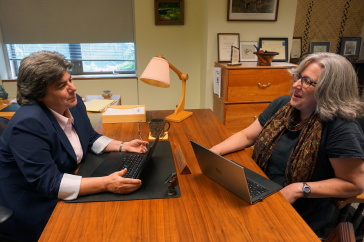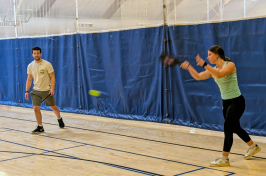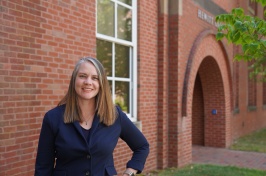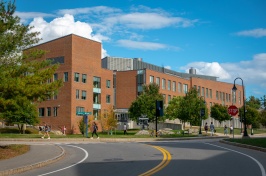UNH and CCSNH Sign Agreement to Ensure Transfer Students Succeed

Kim Babbitt, COLSA’s associate dean of academic affairs, and Leslie Barber, professor of biology at Great Bay Community College and faculty fellow at CCSNH, discuss an articulation agreement between COLSA at the University of New Hampshire and the Community College System of New Hampshire. Courtesy photo.
DURHAM, N.H. — The College of Life Sciences and Agriculture (COLSA) at the University of New Hampshire and the Community College System of New Hampshire (CCSNH) have signed a universal articulation agreement that for the first time creates a pathway for students seeking to transfer from any of the seven community colleges in New Hampshire into any of the 10 life sciences programs at UNH.
The new agreement addresses longstanding challenges transfer students face: whether the courses they take at their community college will be accepted for credit and having confidence that if they take core courses required for their major before transferring, the courses will be equivalent in scope and difficulty to those at the four-year institution.
Kim Babbitt, COLSA’s associate dean of academic affairs, and Leslie Barber, professor of biology at Great Bay Community College and faculty fellow at CCSNH, spearheaded the articulation, establishing equivalency for 43 biology courses, 10 chemistry courses, 15 physics courses, and 19 math courses, which make up the core requirements of COLSA’s life science majors.
In the past, Babbitt says, community college courses were deemed equivalent by examining a course outline without a thorough comparison of the content. Students would arrive at UNH unprepared for the work required in higher-level courses and might have to repeat these courses due to poor performance. This could lead to longer graduation times and paying twice for the same course, which undermines the cost saving achieved by starting out at a community college.
“The data couldn’t be clearer, said Barber. “The longer it takes students to complete a degree, the less likely they are to complete their degree. It’s so important for financial reasons and completion reasons to keep the students on track.”
The clear guidance and assured equivalencies in the new agreement mean students can enroll in core courses like biology and anatomy and physiology that count toward their majors at UNH, not just general education classes. The alternative – saving all the intensive lab courses for UNH – is a plan that Babbitt warns against.
“Students have this idea that you go to community college and take all your gen eds, then transfer to UNH and take your science classes,” says Babbitt. “We want students in the life sciences to take a maximum of two courses with labs each semester. Taking four classes with labs in one semester is like having eight classes – that’s a recipe for failure.”
The universal articulation model will soon expand to the community colleges and UNH’s College of Liberal Arts as well as other four-year public colleges in the state.
Latest News
-
October 8, 2025
-
October 2, 2025
-
September 24, 2025
-
September 15, 2025
-
August 21, 2025














































